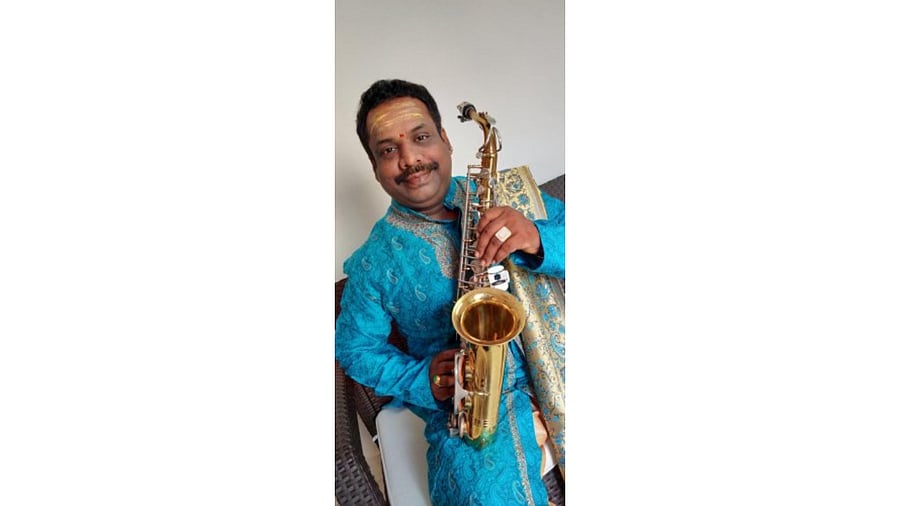
On Carnatic music platforms worldwide, the saxophone has grown by leaps and bounds in the last 25 years. And no major music festival, Western or south Indian classical, is complete without the presence of a saxophone, says Shivamogga K Kumarasamy.
One of very few A-grade saxophone artistes on All India Radio, Kumarasamy gets requests for Kannada compositions when he tours abroad. “I go on an American tour, and people ask for Bho Shambho (raga Revati) and Tamboori Meetidava (raga Sindhu Bhairavi),” he says.
Kumarasamy, 46, settled in Chennai to pursue his musical interests, had his basic education in Shivamogga, where he was born. And what T Chowdaiah did for the violin, Kumarasamy is doing for the saxophone. “My breath was for the saxophone,” he says.
His father, A P Krishnamurthy, was a saxophone player himself and would stick to semi-classical compositions---he played devaranamas at festivals, temple events and weddings. “His ‘Nammamma Sharade’ most times got an encore! As a toddler I used to sit on his lap while he played, but gradually I ended up fighting with him to take centre-stage at wedding concerts,” says Kumarasamy.
He was later mentored by Uppinangadi Nagesh, hailing from a tradition of saxophone players. “It was a huge learning phase for seven years in the picturesque town of Uppinangadi, which lies between Puttur and Dharmasthala,” he says. Nagesh, he emphasises, is one of the foremost musicians who popularised saxophone in Carnatic music circles.
Call it providence or destiny, the renowned saxophonist Kadri Gopalnath, who often visited Sringeri, Dharmasthala and nearby towns for his concerts, once heard Kumarasamy, and declared, “The potential in Kumarasamy will make him another saxophone master to emerge from this region!” Kadri invited him to go over to Chennai for lessons.
“Thirty years ago, Kadri was a star, a colossus who was graceful enough to identify me and give me encouragement. Although I never went to him, my senses flowered listening to him and I became a huge aficionado of his music,” he says.
Kadri’s push inspired him to bring several ‘mangala vadya’ artistes from Shivamogga district under one roof to launch the Shivamogga District Mangala Vadya Artistes Association, which strives to help needy artistes.
Until his early thirties, Kumarasamy was immersed in the style of his guru Nagesh. “Although I had released half a dozen recordings when I was between 25 and 30, covering classical, dasara padagalu, Carnatic jazz and folk, I was looking to widen my repertoire, and take my ‘gayaki style’ forward. With dreamy eyes, I approached the stalwart vocalist and percussionist T V Gopalakrishnan in Chennai to ask if he could hone my instrumentation and presentation techniques to suit concert renditions,” he says.
Ever ready to help true seekers, Kumarasamy says, TVG agreed. “For 14 years, I have followed his emotive styling,” he says. Nothing was thunderous and harsh about the saxophone anymore. TVG led him into a world where understanding the bhava behind the lyrics, getting the right finger techniques, and making every sangati true became the pursuit. “It was extended learning for me,” says Kumarasamy, immediately transporting this reporter to his sensitive elaboration of ‘Baaro Krishnayya’ (Ragamalika-Kanakadasa), his myriad improvisational phrases showing up in much restrained elucidation.
Concert tours in India and abroad have been steady, and awards and recognitions have followed him. He is now the ‘asthana vidwan’ at the Kanchi Kamakoti Peetam.
Kumarasamy’s son, Pravin Pundit, is a saxophone prodigy handpicked by TVG for training. In Chennai, Kumarasamy launched the Saxophone Kumarasamy Academy of Music, and teaches online and offline. “Students include foreigners keen to get familiar with the Indian style of the wind instrument,” he says.
When Kumarasamy plays, it is a river of melody, as Ramakanth Srikantan of the Vidwan R K Srikantan Trust said at a concert last week.